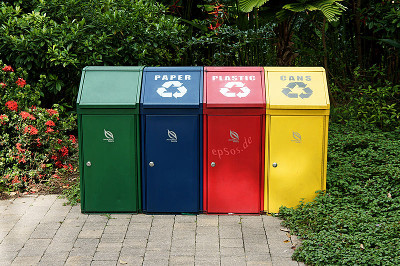When Not to Recycle

Recycling is important… and for the most part, it’s not hard to adhere to an effective routine.
Plastics, glass, paper and aluminium: bag it up, bin it, and let the recycling plant process it for a whole new lease of life.
Food waste on the other hand is easily turned to compost, going straight back into the soil and providing rich nutrition for the next crop.
However, what about those other items? The non-recyclables?
Let the Rubbish Please Company have a say.
Actually, It’s Not That Simple…
There’s more to recycling than simply throwing all your re-usables into the appropriate bags – namely, the lengthy and complicated manufacturing process that takes place at the other end.
The problem is, while the process of gathering recyclable materials may be getting easier, these substances are becoming increasingly difficult to reuse. Since the advent of single-stream recycling collection, the process at our end has become easier – but an increased degree of contamination makes it even harder for those materials to be sorted and recycled at the other end.
Of course, there’s something we can do to fix this – although it may sound counterintuitive.
Stop Recycling!
Yes, you read that correctly… sometimes it’s better just to leave waste materials in your general rubbish, rather than trying to sort it for recycling.
This doesn’t apply to all materials, of course, so you’ll need to use your common sense. Broken glass is a great example. By the time your waste reaches the recyclers, that glass will have shattered into thousands of tiny pieces, which end up cross-contaminating all manner of waste – from aluminium cans to paper – and rendering it unusable by the recyclers.
Even in a specialised glass recycling plant, the wrong glass can cause havoc. In the worst cases, the fine glass from windowpanes, mirrors or tumblers can even cause equipment malfunctions at the processing stage.
There are similar problems with recycling paper.
Food waste and grease are liable to cause bacterial contaminations in a paper recycling plant, so be sure to keep your takeaway boxes and cartons out of the recycling bin.
The same goes for coffee cups and milk cartons. The waxy layer that coats these can be difficult to remove, again causing problems for the recyclers.
One Solution…
On a housing estate in Rotherhithe, Southwark Council – in partnership with Veolia Environmental Services – are trialling a novel new approach.
Non-recyclable materials such as meat wrappers, crisp packets and more are being incinerated to produce heat, which is then piped around the properties located on five Rotherhithe estates. The scheme, if successful, will provide heating and hot water to a total of 2,500 people.
Naturally, smoke from the incinerators at Deptford will need to be thoroughly treated and filtered, before being released into the atmosphere. The projected scheme is estimated to cost around £7 million, and won’t be ready to run until the end of the year – but it is likely to reduce carbon dioxide emissions by 8,000 tonnes a year, as well as keeping a vast bulk of waste matter out of landfills.
What Can You Do to Help?
Of course, we don’t all have £7 million to hand, ready to spend on new incineration and air filtration system.
However, there are some ways you can help:
1. Reduce food-contaminated waste
Wash out jars, cans and bottles – but fast food wrappers, papers and pizza boxes should go in your normal bin.
2. Buy recycled products whenever you can
Demand helps create a market – so even when you don’t see them offered, you need to be out there asking for recycled goods.
3. Support your community
Look out for local recycling drives, collections and fundraisers – and get involved!
4. Look for other ways to recycle
There are other, more creative options you can consider, too.
Check out Earth911 for some fun home recycling ideas, such as broken glass mosaics. If you’re in any doubt about what you should or shouldn’t be recycling, then just remember – you can give our experts a call anytime, to find out more about our conscientious rubbish removal services.
Image source: www.flickr.com
